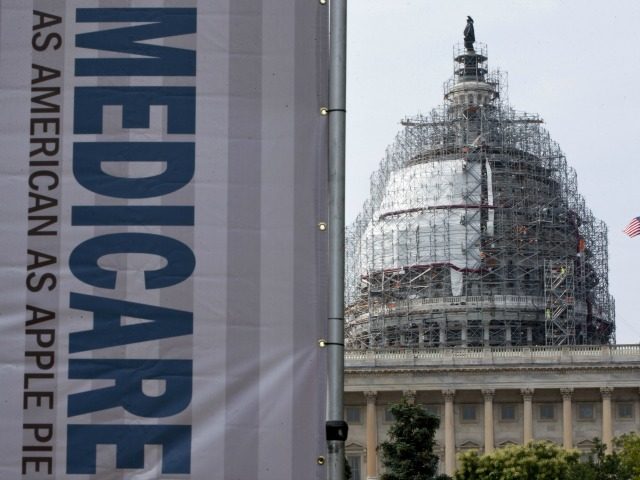The Obama administration’s controversial proposed rule to push Medicare doctors and hospitals to prescribe lower-cost cancer and other types of drugs was decided upon by unelected bureaucrats making legislative decisions for America’s seniors.
The proposed rule will affect all Medicare Part B providers and nearly all Medicare drugs by implementing a “test program” nationwide that will impose a new Medicare payment for doctors and hospitals.
In the first phase of the test change, Medicare Part B’s drug payment to providers would move from the average sales price of a drug, plus an additional 6 percent, to a flat fee of $16.80 per day, per person, and would cut the additional payment from 6 percent to about 2.5 percent.
In an op-ed at the Wall Street Journal, Dr. Jeffrey Vacirca, CEO at NSHOA Cancer Center, explains how the new rule would affect doctors who administer cancer drugs to seniors on Medicare:
The idea is to use financial incentives to push doctors to make “value-based care” decisions and prescribe cheaper treatments. Unfortunately, modern-day medicine isn’t as black and white as the administration seems to think. Take cancer care, my specialty. There are very few instances when the substitution of a less expensive cancer drug is appropriate or safe for patients. After all, there is a reason the newer, more advanced drugs—such as those that helped former President Jimmy Carter put his cancer into remission—are considered groundbreaking.
The Medicare drug payment rule is significant in several ways, perhaps most important of which is that it is yet another Obama use of the “administrative state,” sometimes referred to as the fourth branch of government, to “make” laws. Once again, as with Obamacare, illegal immigration, and, most recently, gender ideology executive action – to name just a few – Obama and his deputies are attempting an end run around Congress, “making” laws for Americans.
In the case of the current proposed Medicare rule, the rule-maker is the Center for Medicare and Medicaid Innovation (CMMI) – an agency that was actually created by Obamacare itself. As progressive administrations have known for years, once bureaucratic agencies “make” laws, Congress often shrinks from addressing their repeal or alteration in timely fashion, if at all. Consequently, Congress weakens itself as the legislative branch of government while Americans simply absorb changes to their lives made by unelected bureaucrats.
Writing at Hillsdale College’s Imprimus, Columbia Law School Professor Philip Hamburger describes how easy it has been for progressive politicians to gradually assume “absolute power” over American citizens through the administrative state.
He writes:
[O]ver the past 120 years, Americans have reestablished the very sort of power that the Constitution most centrally forbade. Administrative law is extra-legal in that it binds Americans not through law but through other mechanisms—not through statutes but through regulations—and not through the decisions of courts but through other adjudications. It is supra-legal in that it requires judges to put aside their independent judgment and defer to administrative power as if it were above the law—which our judges do far more systematically than even the worst of 17th century English judges. And it is consolidated in that it combines the three powers of government—legislative, executive, and judicial—in administrative agencies.
In his opening statement at a hearing of the House Energy and Commerce Subcommittee on Health, chairman Rep. Joe Pitts (R-PA) specifically cited the danger of the Medicare payment proposed rule due to administrative rule-making:
[P]erhaps the most concerning aspect of this proposal is that it came from unelected bureaucrats in this Administration who made decisions behind closed doors affecting our seniors and their health care. What happened to the transparency and regard for stakeholders that we expect when considering proposals of this magnitude?
As Pitts states, the proposed rule regarding Medicare part B provider payment cuts is so controversial that 242 members of Congress have written to the Obama administration and asked that the rule be withdrawn.
The members’ letter to the Centers for Medicare and Medicaid Services states:
CMS’ proposed Medicare drug experiment would unnecessarily disrupt care for the sickest seniors who depend on Medicare, including those with cancer, macular degeneration, rheumatoid arthritis, neurological disorders, and primary immunodeficiency diseases. Given these concerns outlined here, we ask that CMS withdraw this proposed rule that could endanger access to care for America’s most vulnerable seniors.
Additionally, Rep. Larry Bucshon (R-IN) and Rep. Robert Dold (R-IL) have introduced legislation that would prohibit any further action on the Medicare Part B rule.
“We cannot allow unelected DC bureaucrats to run an experiment with Medicare beneficiaries that could disrupt care for the people who need medications most, including those with cancer, arthritis, and other diseases,” Bucshon and Dold said in a statement. “Their unilateral decision to cut Medicare benefits will compromise the health of our nation’s most vulnerable.”

COMMENTS
Please let us know if you're having issues with commenting.